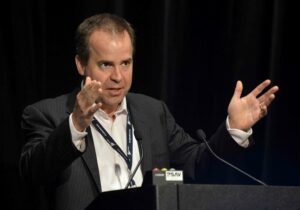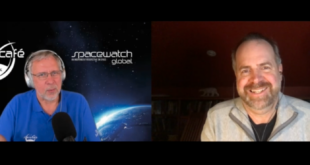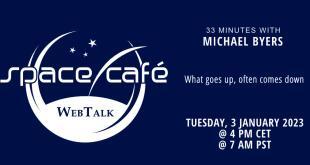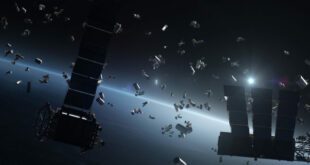by Luisa Low

During this week’s SpaceCafé, SpaceWatch.Global publisher Torsten Kriening caught up with leading global politics and international law expert from the University of British Columbia’s Department of Political Science and co-director of the Outer Space Institute, Professor Michael Byers on the urgent need for countries to agree to ban anti-satellite weapons tests.
Professor Byers has led research on outer space, Arctic sovereignty, climate change, the law of the sea, the laws of war, as well as Canadian foreign and defence policy. He has been a visiting professor at the universities of Cape Town, Tel Aviv, Nord (Norway) and Novosibirsk (Russia) and contributes to Canada’s The Globe and Mail.
This week, he and Torsten discuss the urgent need for the reduction and prevention of space debris, and how countries should develop a consensus for space sustainability and the reduction of space debris.
“We have a serious problem going forward”
Often tiny and microscopic, the threat of space debris colliding with essential orbital infrastructure is ever-present.
In 2007, China tested a ground-based weapon against one of its own satellites – which resulted in the largest debris creating an event that has ever been recorded, with tens of thousands of pieces of debris catapulted into Earth’s orbit.
Several years later, one of these debris fragments of debris collided and disabled an operational satellite.
The issue with debris is that – much like PFAS chemicals on Earth – these “forever fragments” continues to amass and collect – and there are no mechanisms by which they can biodegrade or disappear. They continue to spin around the Earth, which means they’re an ever-present threat to our growing lower Earth orbit footprint.
International Open Letter on Kinetic Anti-Satellite (ASAT) Testing
Canada’s Outer Space Institute has authored an International Open Letter on Kinetic Anti-Satellite (ASAT) Testing, which urges the UN General Assembly to take up consideration of a treaty that would prohibit conducting debris-generating anti-satellite weapons tests.
In a statement on their website, the Outer Space Institute says the number of active and defunct satellites in orbit has grown from 3300 to over 7600 in the last decade, with the potential addition of as many as 100,000 active satellites within the next ten years.
The Institute says such a treaty is needed to prevent a catastrophic event, given the rapid growth of the number of satellites in orbit. Already, signatories include foreign policy and space heavyweights such as former Labor Prime Minister of Australia Kevin Rudd and retired Canadian Space Agency astronaut Chris Hadfield.
Professor Byers says space must be developed in a safe and sustainable way to ensure a catastrophe does not emerge from the rapidly growing industry.
“We can identify a crisis before it becomes a full blown crisis – and we can avoid it through collective action.”
Collective action is growing
The Outer Space Institute’s lobbying is leading to some momentum on this growing issue. Through diplomacy and advocacy, there have been incremental steps towards a treaty.
In 2020, a United Nations General Assembly resulted in nations states conveying their views on the matter to the UN Secretary-General, none of them argued for the testing of anti-satellite weapons.
“Most significantly, not a single country suggested that the use of an anti-satellite weapon for testing was appropriate or legal, they all agreed that this is a bad thing.
“And now, to our considerable satisfaction, the British delegation at the United Nations General Assembly has put forward a second resolution which will be voted on in the next few weeks.
“That resolution – if adopted – would create an open-ended working group that would begin to not only discuss but potentially negotiate a document on space weapons, that might well include some kind of ban on kinetic anti-satellite weapons.”
“An open-ended working group is the first step in treaty negotiations.”
To listen to Michael Byer’s insights into global space policy and a ban on anti-satellite weapons tests, you can watch the full program here:
Space Café is broadcast live Tuesday at 4 pm CEST. To subscribe and get the latest on the space industry from world-leading experts visit – click here.
Luisa Low is a freelance journalist and media adviser from Sydney, Australia. She currently manages Media and Public Relations for the University of Sydney’s Faculty of Engineering.





